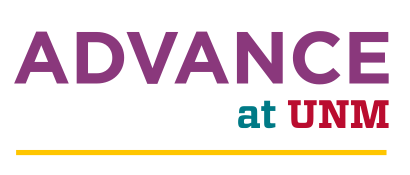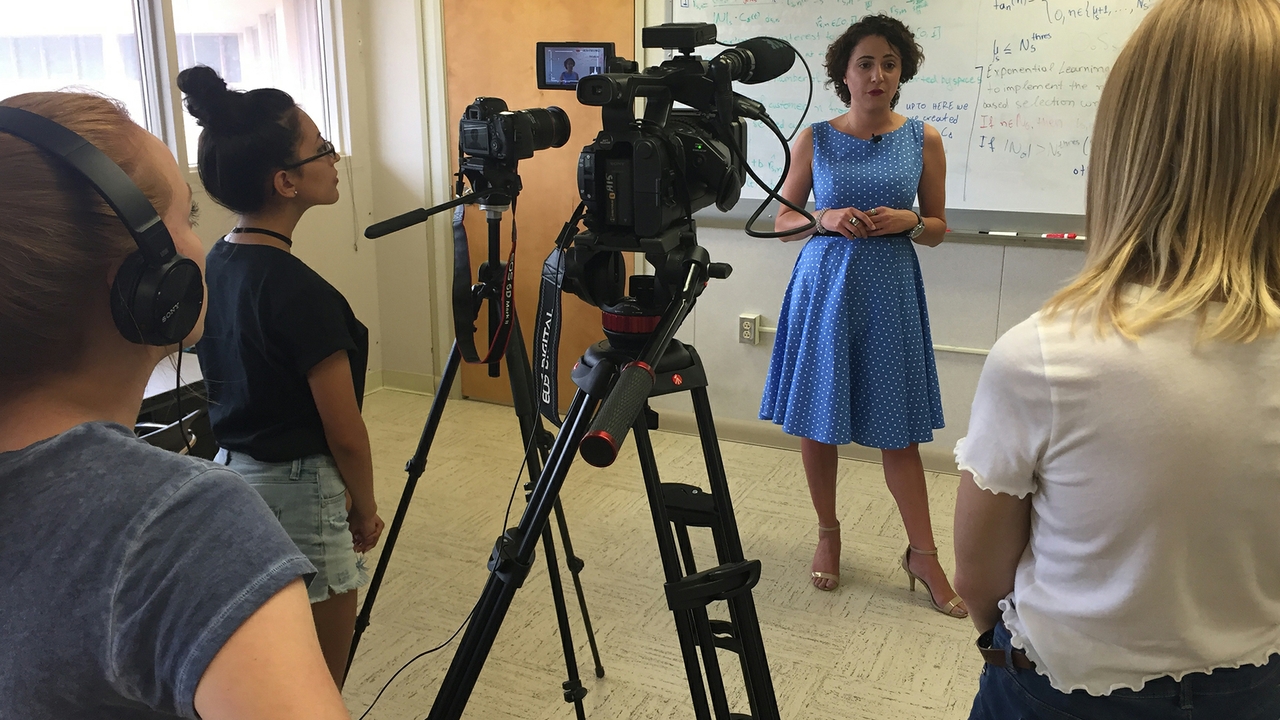Advance interns learn real-world communication skills
By Mary Beth King / UNM UCAM
Four students at The University of New Mexico are getting real-world experience creating digital and social media content through a multimedia communication internship that recently was cited by the National Science Foundation as a national model for employing students and highlighting the work of women and minority STEM faculty.
The students work for the Advance at UNM program, a five-year, $3.3 million grant program that recruits, retains and promotes women and minorities in STEM fields at UNM. The program also includes an eclectic and experienced group of faculty and staff who work to contribute to increased success and satisfaction for women and minority faculty.
In the internship program, Makayla Grijalva, Felina Maria de la Luz Martinez, Marina Bernal, and Jessica Davis tell the story of women and minority STEM faculty at UNM on the web and through social media. They learn multimedia story-telling through writing, shooting and editing video, photography, live video production, and web and graphic design.
The team is run by Kate Cunningham, Advance’s director of communication and social media. Cunningham, a 1999 UNM graduate with degrees in journalism and Spanish, also teaches multimedia journalism at UNM. She created the internship program with the goal of giving students a real-world opportunity to practice digital storytelling skills.
“As part of my experience teaching in the Communication and Journalism Department for the past nine years, I have found that internships where students can practice skills including video production or social media management are critical,” she said.
“Skills like doing an interview with someone and being able to convey what they said to a large audience are things you can only learn by doing. The same is true with learning to navigate deadline pressure or the challenges of publishing online, for example. Our interns get all of those experiences as they consider a variety of career fields where such skills are in high demand,” said Cunningham, who has a master’s degree in digital journalism and design.

Interns say the work has been valuable because of the skills they’ve learned and meaningful because of the mission.
An undergraduate student pursuing a double major in Multimedia Journalism and Political Science, Grijalva is also working as the multimedia editor at the Daily Lobo.
“This internship has been an incredibly valuable experience. I love being able to tell stories and learning to tell stories about what amazing women and minorities are achieving in science research is incredibly rewarding. I have never met a researcher not excited to talk about their research and we give them a platform to be recognized for the hard work they are putting into it,” she said.
A favorite project for Grijalva was an interview with Earth and Planetary Sciences professor Jin Zhang last year about her NSF CAREER Award.
“After my story was published on the Advance website, I also had the opportunity to have that story published in the UNM newsroom which was very cool,” she said.
Grijalva also leads the “5 things to know” campaign at Advance, a video series aimed at informing UNM faculty about resources available to them on campus. It also offers tips on various challenges they might encounter and general information that the Advance internship team feels is useful.
“We have produced videos covering how to flip a classroom, the faculty role in reducing student stress, science communication and more,” Grijalva said.
Martinez is an undergraduate majoring in Film and Digital Media and minoring in Journalism.
The Advance internship caught Martinez’s interest when she realized she could apply and further her digital media skills to promote and advance women and minorities in the STEM fields.
“This internship has been one of my most rewarding experiences at UNM thus far. As someone who’s fluid between mediums, Advance’s multimedia approach to storytelling and marketing is the perfect fit for me. As a woman and minority myself, it makes what I do much more meaningful to me knowing I’m helping to change the climate at UNM and advance those who have been systematically overlooked, particularly in STEM. Being in Advance has helped me find direction in my skills and develop my voice as a multimedia storyteller. Come graduation, I hope to do something similar as my career,” Martinez said.
“It’s always exciting to get out of the office and onto the field. Last summer we had the opportunity to do just that as we followed Dr. Laura Crossey and her team of students in the stunning Valles Caldera National Preserve to document her research on water quality and sustainability. This project falls under the Grand Challenges initiative on sustainable water resources,” she added.
An undergraduate student pursuing a major in Film and Digital Media Arts with a minor in Arts Leadership and Business, Bernal is also working as an associate producer intern for New Mexico PBS’s ¡COLORES! She came to UNM from Barcelona, Spain.
“My favorite piece so far has to be Diana Dragomir, a brilliant exoplanetologist who hopes to get young people excited about doing research and see astronomy more gender balanced, Bernal said.
Davis is also majoring in Interdisciplinary Film and Digital Media and minoring in Arts Business and Management.
“As an intern at Advance at UNM, I have learned a lot about creating short form documentaries, managing social media, and writing formal articles about women in STEM. This experience has been unique because I am able to create media with a specific audience in mind with funding from the NSF. It’s very satisfying to be able to take skills that I am learning in my film classes and put them toward a great cause,” she observed.
Davis said her favorite project was “Getting Drier Over Time” filmed in the Sevilleta National Wildlife Refuge. The video is about UNM Biology professor Jenn Rudgers who leads a team of scientists studying climate variability at the refuge.
Right now during the COVID-19 pandemic, the interns, like much of the UNM staff, faculty, and student body, are working remotely.
“Their schedules don’t usually line up during a regular semester, so we are used to working together as a group while sometimes apart. We’re taking this time to work on website updates and video edits,” Cunningham noted. Students can do much of their work, such as analyze social media or newsletter performance, remotely.
NSF reviewers who came to campus late last year as part of a routine site visit lauded the program’s communication team.
“The media/communications piece of ADVANCE at UNM provides a model for other institutions seeking to increase awareness and recognition for faculty and program accomplishments while also involving students as interns in a way that achieves broader impacts,” reviewers wrote.

In particular, reviewers were excited about the training for interns.
“The communication team’s use of student interns provides great training for UNM undergraduates while providing a professional media presence to all stakeholders. ‘STEM SHOUTOUTs’ provide a public spotlight on the interesting research women and [Under Represented Minority] faculties are doing at the institution,” reviewers wrote.
Along with the STEM Shoutouts, which highlight research and awards of STEM faculty, the review team praised the publicity efforts surrounding the annual Women in STEM awards, which are hosted by Advance and the Office of Academic Affairs, saying the work done by Advance “should be publicized by NSF as potential best practices at other institutions.”
Cunningham recently authored a peer-reviewed journal article that explores the experimental and iterative teaching methods she uses for the internship program. The article was published in the December 2019 edition of the Teaching Journalism and Mass Communication.
Cunningham also presented a poster about the work of the communication team at the Equity in STEM Community Convening conference hosted by the Advance Resource and Coordination Network and the Association for Women in Science.
Advance at UNM team members in 2018 published a book chapter about the project’s work incorporating social media into sponsored projects.

